Parking in France
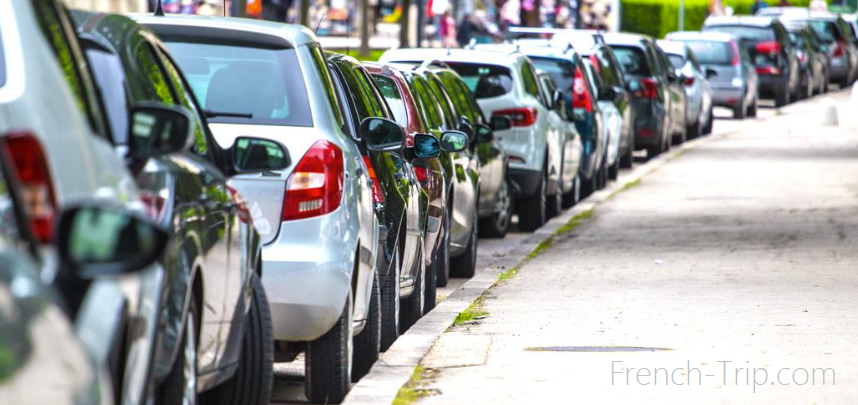
Parking in France is not as challenging as in some other European cities. However, you should avoid leaving your car on a convenient corner: parking is only allowed in designated areas on the street or in parking lots.
The conditions and color-coding of parking zones can vary depending on the city. Street parking in France may be allowed or prohibited depending on the time of day, day of the week, and whether it’s an odd or even day of the month.
Parking Rules in France
In many French cities, parking is allowed on one side of the street (usually the side with odd-numbered houses) in the first half of the month, and on the other side in the second half of the month. This is known as “stationnement alterné semi-mensuel” (semi-monthly alternate parking). Parking rules may also change weekly or daily. Signs like “Côté du Stationnement – Jours Pairs” (on even days) or “Jours Impairs” (on odd days) indicate daily parking regulations. In Paris, you may find signs prohibiting parking during specific times (e.g., for street cleaning).
Street parking is prohibited on many streets, especially in Paris. Parking in Paris is primarily forbidden on main roads, marked as “red routes” (axe rouge).
If street parking is marked with “PAYANT,” it means it is paid parking, and you need to find a parking meter. Even if such a sign is not present, you should still look for a parking meter nearby. You might need to display a ticket indicating your arrival time, as the duration of parking may be limited.
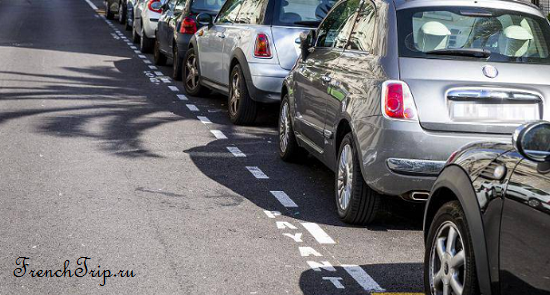
Prohibited Parking Areas in France
“Stationnement interdit” means “No parking.” This sign may be supplemented by a sign with a crossed-out “P.” A no-parking sign may also be labeled “Stationnement gênant,” with a picture of a tow truck (if you park in a taxi stand or in front of a private garage, your car will likely be towed or wheel-clamped) or in yellow-marked zones on the street.
Parking in front of fire hydrants is prohibited. In Paris, leaving your car in the same spot on the street for more than 24 hours is also forbidden. Parking trailers on streets in Paris is prohibited at all times, as is the case in some other cities.
Roadside parking overnight is prohibited in France, although you can stop if you are falling asleep at the wheel. On roads outside the city, you must pull off the roadway to stop your car.
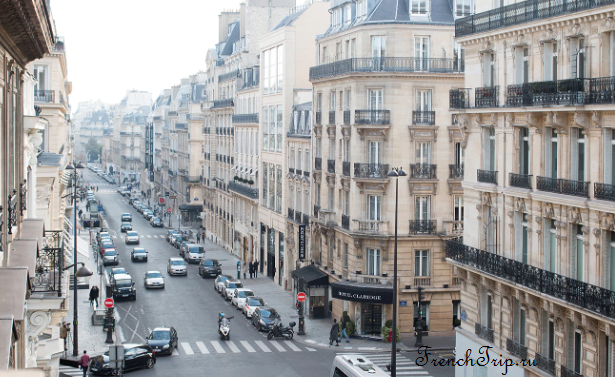
Parking Costs in France
Parking rules and costs vary significantly by city. In some cities, for business convenience, the first 30 minutes or even 1 hour is free; in others, payment is required from the first 15 minutes. The larger and more touristy the city, the higher the cost of parking. On average, 1 hour of parking in France costs around €2.5 – €3.5. Parking for 1 day (usually counted as 24 hours) in major cities can cost about €20 – €35 in the city center. In smaller cities, where land is less valuable, daily parking can be found for €10 – €15.
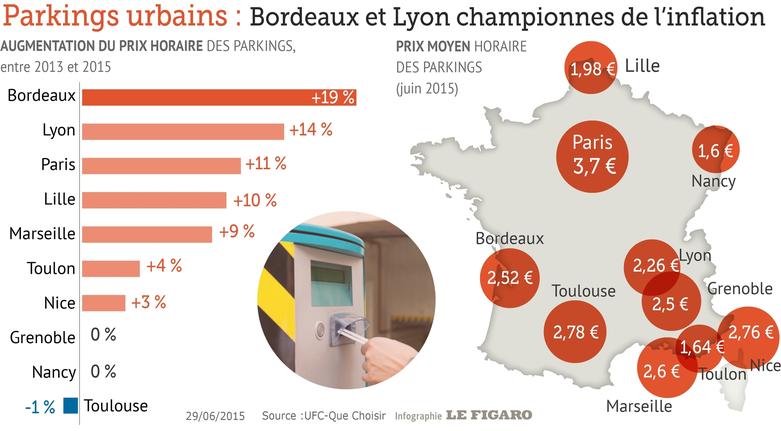
Blue Parking Zones
In many French cities, “blue zones” (“zone bleue“) are intended for free temporary parking for 1 hour from 9:00 to 12:00 and from 14:00 or 14:30 to 19:00 (sometimes from 9:00 to 19:00 or 20:00 without a break) from Monday to Saturday, with no time restrictions outside these hours or on Sundays and holidays. Parking is not limited between 12:00 and 14:00, so you can park for free from 11:00 to 14:00 or from 12:00 to 15:00. For example, if you park at 18:00 and have a free 1-hour parking period, this period extends into the free time, so you can park from 18:00 to 9:00 the next day.
If parking is paid during the indicated period, it becomes free outside the “paid” time, on Sundays and holidays (this applies only to street parking, underground parking is regulated differently).
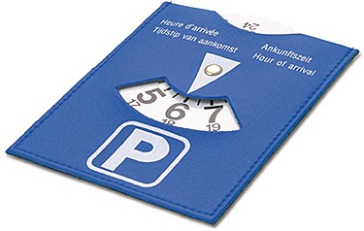
Parking Disks
You must place a parking disk (de contrôle/stationnement) under your windshield indicating the time you parked (rounded up to the nearest half-hour, so arriving at 11:10 can be marked as 11:30). You can buy a parking disk at gas stations, tourist offices, tobacco shops, police stations, and tourist offices for a few euros.
You CANNOT simply extend the time on the disk. You MUST leave the parking spot after the allowed time, or you risk a fine for incorrect parking.
Parking Meters
Street parking in France, especially in city centers, is usually paid. Payment is made at parking meters — horodateurs. If parking zones are marked with signs “Horodateur,” “Stationnement payant,” or “Payant,” you must pay for parking when you park: pay for the estimated time at the meter, get a parking ticket, and place it under your windshield. The ticket indicates the time until which parking is valid. Usually, parking is only paid from 9:00 to 19:00, with a free period from 12:00 to 14:00.
Parking conditions and costs, as well as the maximum allowed parking time, are indicated on the meter. You insert coins (coins accepted by the meter are indicated on it. Credit cards are rarely accepted, so have change ready), and the display shows the time until which you can park. When you press the green button, the paid amount is accepted, coins drop into the meter, and you receive a parking ticket.
Usually, the cost of street parking is around €1 – €3.5 per hour (more expensive if it’s a station parking lot). Parking meters accept 5, 10, 20, and 50 euro cent coins, as well as €1 and €2 coins. In some cities, like Annecy or Nice, the first 30 minutes of parking is free.

Parking Payment in France
With covered parking, the process is clear and predictable — at the exit, there are machines where you insert the ticket received upon entry and pay the displayed amount with coins or a credit card. With street parking in France, the process can vary significantly.
New types of parking meters have replaced the simple ones where payment was made only with coins and the ticket was placed under the windshield.
If you see a meter with a large keyboard, you need to enter your vehicle number when paying for parking.
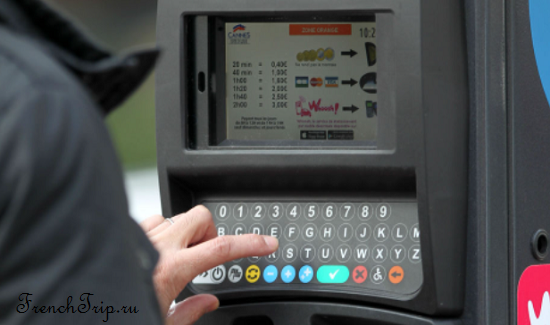
Many parking meters now accept credit card payments.
Technology is advancing, and now even in France (those who remember the difficulties with Wi-Fi in hotels not long ago understand the irony), there are parking options with payment through smartphones and mobile apps. It’s worth researching parking options in a specific city in advance, especially if you plan to park frequently, and download the necessary app. This method of payment allows for more precise and flexible parking payments.
Such apps are available in all major cities, from Paris to Nice. So, if you’re used to this method, don’t hesitate to check for this option in advance.
You can also pre-pay for parking for a selected time through parking websites. This saves time searching for parking (your spot will be reserved for you!), plus you can enter/exit unlimitedly without needing to use the meter each time. In my opinion, this convenience is minor, but some may find it useful.
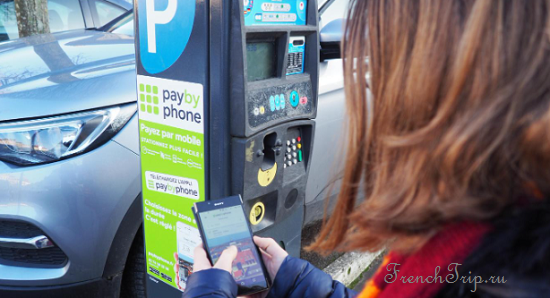
Parking Garages in France
For long-term parking, garages are more suitable. The cost of parking in covered garages can range from €0.30 to €2 per hour and from €2.50 to €15 per day. In central Paris, parking garages can cost around €1.50 – €3.5 per hour and €12 – €35 per day. Long-term parking in most French cities costs from €10 – €35 for the first day, with the cost decreasing for subsequent days.
If you are staying in one city for a long time, you can purchase a monthly parking pass, which helps save money significantly.

Most parking garages operate on a simple system: upon entry, you receive a parking ticket (just press the button on the machine at the entrance). Park your car in a free space, and take the ticket with you (for security reasons). Before leaving, go to the parking payment machine, insert the ticket, and the screen will display the amount you need to pay. You can pay with cash or a credit card. After payment, you have about 15 minutes to start your car and leave the garage. When exiting, insert the PAID parking ticket into the machine, the barrier will lift, and you can calmly leave the garage.
Parking Discounts in France
In most cities, local residents can receive parking discounts by obtaining special parking cards from the local town hall. These parking cards are attached to the right corner under the windshield.
Disabled persons with a valid card confirming their disability (macaron) can park for free or in specially designated spaces. The disability card must be displayed under the side window.
Parking Fines in France
Improper parking is fined, with the amount depending on the severity of the violation.
Typically, improper parking (unpaid or over-extended) results in a fine of €17, which increases to €33 if not paid within 45 days.
Fines for illegal parking range from €35, €68, or €135, which increase to €75, €180, and €375 if not paid within the first 3 months.
Parking fines can be paid by purchasing fiscal stamps (timbre fiscal) at tobacco shops. These stamps are attached to the fine tickets and sent to the authorities. Since January 2006, fines can be paid online through the website www.amendes.gouv.fr.
If your car receives a fine ticket (papillon) and is not moved within an hour, it receives a second fine. After two hours, your car’s wheels may be clamped or it may be towed to an impound lot.
Paris has 6 impound lots (fourrière). In addition to the fine of €35 – €135, you will also have to pay a fee for the impound lot (or for wheel unclamping), plus the cost of parking at the impound lot. However, if you do NOT collect your car within 10 – 45 days, it may be sold. Most impound lots are open from 8 to 20 from Monday to Saturday.
Related links
- France by car
- Traffic Rules in France
- Toll roads in France
- Fines for traffic violations in France
- Parking in France
- How to Travel Cheaper in France
Archives
Calendar
| M | T | W | T | F | S | S |
|---|---|---|---|---|---|---|
| 1 | ||||||
| 2 | 3 | 4 | 5 | 6 | 7 | 8 |
| 9 | 10 | 11 | 12 | 13 | 14 | 15 |
| 16 | 17 | 18 | 19 | 20 | 21 | 22 |
| 23 | 24 | 25 | 26 | 27 | 28 | |